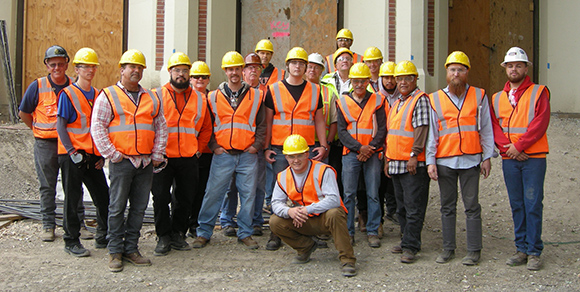
(Photo: North Bay Construction Corps Program)
Shortages in California's construction workforce have left 80 percent of firms in the state with too few workers, a recent survey showed. In the North Bay-Sonoma region, a partnership working to fill the gap for skilled construction workers, which was wide even before wildfires destroyed area homes and businesses in 2017, is earning recognition by the California Economic Summit.
As part of the Summit's 2018 Partnerships for Industry and Education (PIE) Contest, we're featuring another one of the winning workforce development partnerships between education and industry filling a regional need, in this case the estimated 6,000 new construction and trade workers needed annually in the area.
The North Bay Construction Corps Program trains high school seniors for careers in construction and the trades while they earn college credit. The winning program is a partnership begun in 2017 by the Career Technical Education Foundation Sonoma County and the North Coast Builders Exchange and will expand to six cohorts covering Sonoma, Napa, Lake and Mendocino counties.
At the Summit's annual statewide gathering in Santa Rosa on November 15-16 the four winning public-private partnerships will be honored and their best practices shared in a showcase session on workforce development.
We asked Kathy Goodacre, executive director of the Career Technical Education Foundation, to answer questions about the partnership:
California Economic Summit: Briefly tell us who came up with the idea of the partnership and how did you organize it?
A special workforce development committee of the North Coast Builders Exchange (NCBE) Board of Directors first conceived of the idea to create a program that would introduce high schoolers to career opportunities in construction and the trades.
Doug Hamilton, president of Oak Grove Construction, proposed to develop a construction-training program modeled on a local Fire Explorer initiative. The NCBE special committee asked the Sonoma County Office of Education (SCOE) and Career Technical Education Foundation (CTEF) to join them in the formulation of program structure and curriculum. CTEF assumed the role of program management, inclusive of fundraising, contracting program coordinators, recruiting students and paying their stipends, and overseeing evaluation and expansion efforts.
NCBE was instrumental in securing industry involvement – all classes were taught by industry professionals on a volunteer basis, and most of them included a hands-on activity designed to introduce students to technical aspects of a particular career path. Santa Rosa Junior College (SRJC) proved to be another key partner by developing a pathway for participants to earn college credit and by providing necessary insurance coverage for the program.
Who was in your partnership and what were you trying to achieve?
The program steering committee included representatives from all parties listed in the description above. The purpose of the partnership was to design and implement a compelling career awareness and training program that would encourage high school seniors to consider a career in construction and the trades, ultimately serving to create a pipeline of entry-level workers with a realistic idea of what it takes to work and succeed in construction.
Traditionally, employers looked to high school shop classes for entry-level workers, but these students generally had no experience on a construction worksite and hadn’t gotten a true picture of day-to-day expectations of an entry-level employee. As a result, many of these recruits would quit within two to four works of hire. The partners behind the North Bay Construction Corps sought to develop a new talent pipeline of motivated workers with basic skills and certifications that are highly prized in an entry-level employee.
How have students benefited?
Student participants build skills that will benefit them for life – from soft skills such as teambuilding, communication, and creativity to technical skills in tool handling, applied math, and CPR/First Aid. Perhaps most importantly, students gain new confidence in themselves and their employability. This confidence is derived from the student’s ability to articulate his/her skills and interests and then translate that into a career. Every program graduate who wishes to be employed in construction gets one or more job offers. Finally, the program helps students explore ways they can serve their community in the rebuild process.
How have you and other employers benefited?
NCBE benefits by being able to provide a new service to its members – viable candidates for entry-level construction workers. Participating in the development of the Construction Corps has also strengthened NCBE’s capacity to create meaningful and successful programs that benefit not only industry but also the community.
CTEF benefits by increasing its visibility through a mission-aligned program that drives cultivation of new industry partners who can be leveraged to support other industry-education initiatives, including work-based learning and teacher externships.
Employers benefit by having a new pipeline of skilled, motivated and local workers for their industry.
For the last seven years the California Economic Summit has been working on making workforce preparation an imperative. What can other employers and educators learn from your partnership?
Having an intermediary that serves to connect education and industry is extremely helpful. The intermediary identifies key players, provides context and information on other relevant initiatives, cultivates and convenes partners, and then coordinates implementation of devised solutions. CTEF served in this role for the NBCC and was crucial to the development of an easy and efficient partnership. The intermediary provides a point of entry for the partnership, helps break down perceived barriers, and streamlines activities.
To register for the 2018 California Economic Summit on November 15-16 and hear from people representing winning partnerships, click here.
See you in Santa Rosa!




